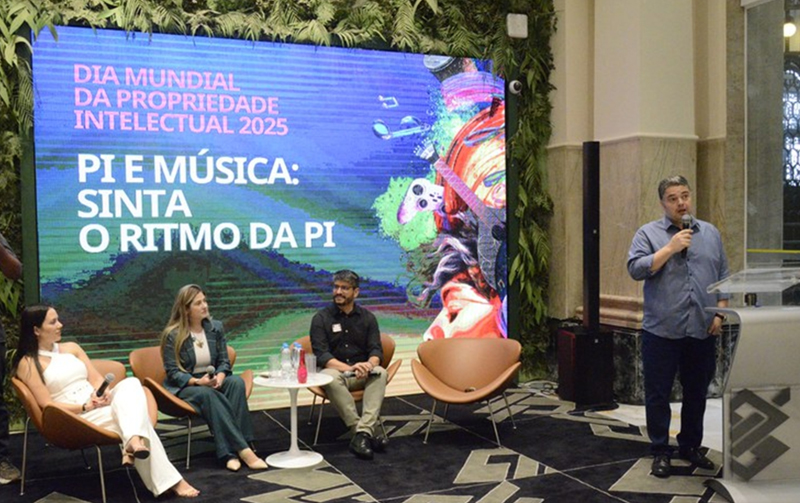
Published in 30/04/2025 17:05 Updated in 30/04/2025 18:16
Brand management, patents in music, protection of intangible culture, equipment with registration of industrial designs, copyright in the digital universe and the use of computer programs in musical creation. These were topics discussed during the event held by the INPI at CCBB-RJ, on April 30, in celebration of World Intellectual Property Day 2025. The objective was to discuss intellectual property rights and music.
Brand Management in the Music Industry
The first roundtable dealt with "Brand Management in the Music Industry", mediated by the professor of the INPI Academy, Vinicius BogéaCâmara. The musician and professor at FundaçãoGetúlio Vargas (FGV), Leonardo Morel, brought the case study of the GalinhaPintadinha brand, which started with a song released on YouTube in 2006 and is now a great success in several areas. The first registration was granted by the INPI in 2009, for TV and film production, and the last, in 2021, for cosmetics, going through trademark registrations for food, toys, games, clothing and others over the years.
Music-related patents
This was the theme of the second roundtable, with INPI researcher Camila Mie Ujikawa as mediator. She and INPI researcher Alex de Lima e Silva have filed various types of patents, ranging from musical instruments to computer methods and systems for audio. The specialist in Strategic Innovation Management at the Inova-UFRJ Agency, Luiz Gustavo Baptista, made a timeline of patents, starting with Tomas Edson, with the patents for a phonograph and a microphone in 1877, in the United States, until the digital age in the 21st century, which brings new challenges to protect creativity and investment.
IP and Intangible Culture Assets
The third roundtable dealt with "IP Assets and Intangible Culture", mediated by the professor of the INPI Academy Daniel França. The challenges of traditional peoples and communities for the protection of their IP rights was debated by Nana Orlandi and Lucas Canavarro, from the Mi Mawai Platform, of alliances between indigenous artists. They also introduced several laws and international agreements that recognize the collective cultural expressions of indigenous peoples.
The director of the National Museum of Indigenous Peoples, Fernanda Kaingáng, spoke of Brazil's outstanding participation in the construction of the Treaty on Intellectual Property, Genetic Resources and Traditional Knowledge, signed by 176 member countries in May 2024, for the protection of the genetic heritage and culture of indigenous peoples and traditional communities. The challenges of collective brands for traditional peoples and communities was the topic brought to the roundtable by the technical analyst of Social Policies of the National Secretariat for Food and Nutrition Security, of the Ministry of Development and Social Assistance, Family and Fight against Hunger, Camila Carneiro.
Industrial Design and Music
The universe of "Industrial Design and Music" was debated in the fourth round table of the event, mediated by the professor of the INPI Academy, Patrícia Peralta, and the participation of the graphic designer and photographer Philippe Leon Anastassasky, creator of dozens of covers of singles, albums, flyers, DVDs, photo exhibitions, among other productions. ABPI's board member, Ricardo Boclin, gave examples of industrial design registrations in the area related to music, such as musical instruments, speakers, headphones, etc.
IP and the Entertainment Industry
Professor Patrícia Porto, from the Dannemann Siemsen Institute, mediated roundtable number 5, with the theme "IP and the Entertainment Industry". Álvaro Loureiro, from the Dannemann Siemsen Institute, spoke of the multiple protections possible in the music industry, substantially increasing monetization for the artist, being necessary, however, to be aware of the licensing agreements for the use of IP rights, in order to avoid future litigation. Lawyer Gustavo Fortunato, from the Study Group on Copyright and Industrial Law at the Federal University of Paraná (GEDAI/UFPR), addressed the controversy surrounding the use of AI for the production of holographic shows by artists who have passed away and involve inheritance rights.
Computer Program: new tools and resources that facilitate creation
Closing the debates, the sixth round table, on the theme "Computer Program: new tools and resources that facilitate the creation", recording and promotion of music", was mediated by the head of the Computer Programs Division of the INPI, Carlos Alexandre Fernandes Silva. He cited examples of computer program records linked to music, including those related to Artificial Intelligence (AI), such as ContextFy, a tool for music recommendation that considers the current context. The executive director of the Brazilian Institute of Copyright, Luca Schirru, contributed to the debate by presenting issues involving computer programs, AI, music and copyright.

Roundtable 1: Trademark management in the music industry